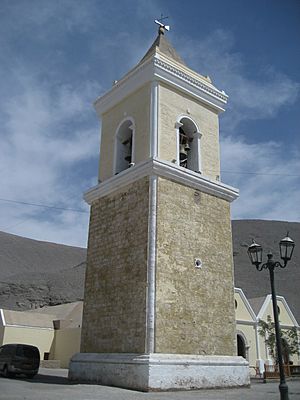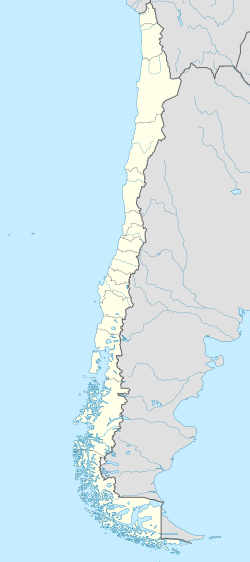Tarapacá facts for kids
Quick facts for kids
San Lorenzo de Tarapacá
Tarapacá
|
|
|---|---|
|
Town
|
|

San Lorenzo Church in Tarapacá
|
|
| Country | |
| Region | Tarapacá |
| Province | Tamarugal |
| Commune | Huara |
| Founded | 1532 |
| Elevation | 1,350 m (4,430 ft) |
| Population | |
| • Estimate
(2002)
|
135 |
| Demonym(s) | Tarapacan |
San Lorenzo de Tarapacá, or simply Tarapacá, is a small town in the Tarapacá Region of Chile. It is located in the northern part of the country. This town has a very long and interesting history, going back hundreds of years!
Contents
History of Tarapacá
Ancient Times and Inca Trail
People have probably lived in Tarapacá since the 1100s. It was an important stop along the famous Inca Trail. This was a network of roads used by the Inca Empire.
When the Spanish explorer Diego de Almagro arrived in 1536, people were already living there. After the Spanish took control, Tarapacá became part of the Viceroyalty of Peru. Later, it was part of the country of Peru.
The War of the Pacific
Tarapacá played a big role in the War of the Pacific. This war happened between 1879 and 1884. The town was the site of the Battle of Tarapacá.
Even though Peru won this battle, their soldiers moved to other cities. This allowed the Chilean Army to take over the area. After the war, Tarapacá became part of Chile under the Treaty of Ancón.
The war had a big impact on the people living there. Many Peruvian families who lived in Tarapacá had to move. The Peruvian government sent them to the Loreto region to help settle new areas. They even named some new places after their old home, like Tarapacá and Puerto Arica.
Later, some of these areas were given to Colombia by the Salomón–Lozano Treaty. The original families moved again, founding new towns like Puerto Arica and Tarapacá near the Napo River.
Saltpeter Industry and Growth
The area around Tarapacá was rich in a mineral called saltpeter. This mineral was very important for making fertilizers and explosives. Because of this, the saltpeter industry grew a lot.
By the 1920s, many people moved to the province of Tarapacá. They came from countries like Peru, Bolivia, England, Germany, Spain, and Croats from Yugoslavia. This caused the population to grow a lot. In 1885, there were about 54,000 people. By 1920, there were over 115,000!
As more people moved in, trade also increased. Goods were brought in from central Chile, neighboring countries, and even from Europe, North America, and Asia.
Historical Recognition
Because of its important history, old buildings, and archaeological sites, the town was given a special title. In 1973, the Government of Chile declared it a Zona Típica. This means it's a special historical area.
Festival of San Lorenzo
Every year, Tarapacá celebrates the Festival of San Lorenzo. This is a religious celebration that starts on August 6.
Notable People from Tarapacá
- Ramón Castilla: He was a very important leader who became the President of Peru.
- Antonio Gutiérrez de la Fuente: He was a military leader and also served as a temporary President of Peru.
- Bautista van Schouwen: He was a Chilean thinker who helped start the Revolutionary Left Movement.
See also
 In Spanish: San Lorenzo de Tarapacá para niños
In Spanish: San Lorenzo de Tarapacá para niños
 | Janet Taylor Pickett |
 | Synthia Saint James |
 | Howardena Pindell |
 | Faith Ringgold |


